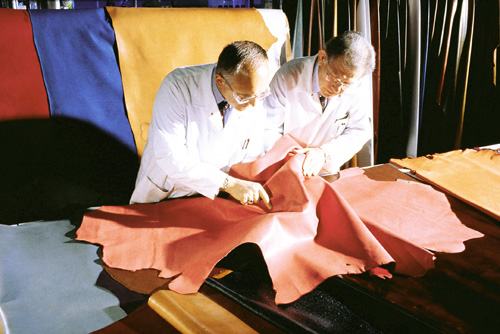
Leather Technology involves the study of processing raw hides or skins into finished leather products. Here’s an overview of the key aspects and a syllabus typically followed in India for Leather Technology:
Key Aspects:
- Raw Material Processing: Understanding the characteristics and properties of raw hides and skins obtained from various animals such as cattle, sheep, goats, and pigs. Leather technologists learn about methods for curing, preserving, and preparing hides and skins for further processing.
- Tanning and Leather Production: Study of tanning processes to convert raw hides or skins into leather. Leather technologists learn about different tanning methods including vegetable tanning, chrome tanning, and synthetic tanning, as well as processes such as soaking, liming, fleshing, tanning, dyeing, and finishing.
- Chemistry of Leather: Knowledge of chemical reactions and treatments involved in leather processing. Leather technologists study the chemistry of tanning agents, dyes, finishing agents, and other chemicals used in leather production, as well as environmental considerations and waste treatment methods.
- Leather Products Manufacturing: Design and manufacturing of various leather products such as footwear, bags, belts, garments, upholstery, and accessories. Leather technologists learn about pattern making, cutting, stitching, molding, and finishing techniques for producing high-quality leather goods.
- Quality Control and Testing: Ensuring the quality and performance of leather products through rigorous testing and quality control measures. Leather technologists conduct physical, chemical, and mechanical tests to evaluate leather properties such as strength, durability, flexibility, and color fastness.
- Environmental Sustainability: Addressing environmental concerns and promoting sustainable practices in leather processing and manufacturing. Leather technologists explore eco-friendly tanning methods, waste minimization strategies, and recycling initiatives to reduce environmental impact.
- Leather Industry Management: Management principles and practices specific to the leather industry. Leather technologists learn about production planning, inventory management, supply chain logistics, cost estimation, and quality management systems for efficient operation of leather manufacturing units.
Syllabus (Typically Followed in India):
- Raw Material Science and Technology:
- Anatomy of Hides and Skins
- Leather Chemistry
- Preservation Methods
- Tanning Technology:
- Tanning Methods (Vegetable, Chrome, Synthetic)
- Tanning Processes (Soaking, Liming, Tanning, Dyeing)
- Finishing Techniques
- Chemistry of Leather Processing:
- Chemical Reactions in Tanning
- Tanning Agents and Chemicals
- Environmental Impact and Waste Management
- Leather Product Manufacturing:
- Pattern Making
- Cutting and Stitching
- Molding and Forming Techniques
- Finishing and Surface Treatment
- Quality Control and Testing:
- Physical Testing of Leather
- Chemical Testing of Leather
- Mechanical Testing of Leather
- Quality Assurance Methods
- Environmental Sustainability in Leather Industry:
- Eco-Friendly Tanning Methods
- Waste Minimization Strategies
- Environmental Regulations and Compliance
- Leather Industry Management:
- Production Planning and Control
- Inventory Management
- Supply Chain Logistics
- Quality Management Systems
- Project Work and Industrial Training:
- Students typically undertake a project related to leather technology in their final year, where they apply their knowledge and skills to solve a real-world problem or develop an innovative solution. They may also undergo industrial training or internships in leather processing units, tanneries, or leather goods manufacturing companies to gain practical experience.
This syllabus equips students with the necessary theoretical knowledge and practical skills to pursue careers in the leather industry, including leather processing, manufacturing, quality control, research and development, and environmental management. Graduates in leather technology play a vital role in maintaining the quality, sustainability, and competitiveness of the leather industry while adhering to ethical and environmental standards.

Your article helped me a lot, is there any more related content? Thanks!
Looking for more info ? Please hold your eyes here